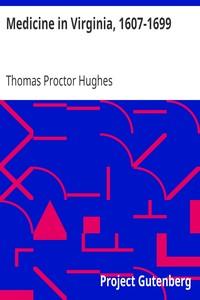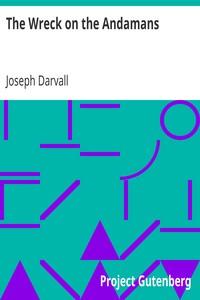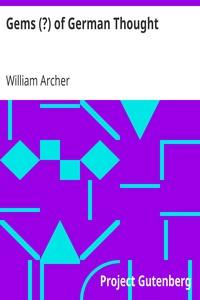Read this ebook for free! No credit card needed, absolutely nothing to pay.
Words: 27115 in 8 pages
This is an ebook sharing website. You can read the uploaded ebooks for free here. No credit cards needed, nothing to pay. If you want to own a digital copy of the ebook, or want to read offline with your favorite ebook-reader, then you can choose to buy and download the ebook.


: Medicine in Virginia 1607-1699 by Hughes Thomas Proctor - Virginia History Colonial period ca. 1600-1775; Medicine Virginia
Acknowledgements and Bibliographical Note 77
European Background and Indian Counterpart to Virginia Medicine
EUROPEAN BACKGROUND
The origins of medical theory and practice in this nation extend further than the settlement at Jamestown in 1607. Jamestown was a seed carried from the Old World and planted in the New; medicine was one of the European characteristics transmitted with the seed across the Atlantic. In the process of transmission changes took place, and in the New World medicine adapted itself to some circumstances unknown to Europe; but the contact with European developments in theory and practice was never--and is not--broken.
Because of this relationship between European and American medicine, an acquaintance with seventeenth-century European medicine makes it possible to give additional support to some of the information in the early sources about medicine in colonial Virginia. In addition, knowledge of the European background allows reasonable speculation as to what happened in Virginia when the early sources are silent.
In discussing the background for American medicine it is not necessary to make a firm distinction between England and the rest of Europe. As today, science--in this case, medical science--frequently ignored national boundaries. The same theories relative to the structure of the body , to the functions of the organs and parts of the body , and to other branches of medical science were common to England and Europe. Medical practice, like theory, varied but in detail from nation to nation in Western Europe.
Seventeenth-century Europe relied heavily upon ancient authority in the realm of medical theory. The European and colonial Virginia physician, surgeon, and even barber consciously or unconsciously drew upon, or practiced according to, theories originated or developed by Hippocrates and Galen . Hippocrates is remembered not only for his emphasis upon ethical practices but also for his inquiring and scientific spirit, and Galen as the founder of experimental physiology and as the formulator of ingenious medical theories. Most often Hippocrates was studied in Galen's commentaries.
In the realm of pathology the humoral theory, with its many variations, was extremely popular. The humoral doctrines stemming largely from Hippocrates were made elaborate by Galen but were founded upon ideas even more ancient than either thinker and practitioner. As understood by the seventeenth-century man of medicine, the basic ideas of the humoral theory were the four elements, the four qualities, and the four humors. The elements were fire, air, earth, and water; the four qualities were hot, cold, moist, and dry; and the four humors were phlegm, black bile, yellow bile, and blood. From these ideological building stones a highly complex system of pathology developed; from it an involved system of treatment originated. In essence the practitioner of the humoral school attempted to restore the naturally harmonious balance of elements, qualities, and humors that had broken down and caused disease or pain.
The seventeenth-century, however, witnessed in medicine the trend, manifest then in so many fields of thought, away from an uncritical acceptance of the authority of the past. It also saw a defiant denial of ancient authority among those more radically inclined, such as the disciples of the sixteenth-century alchemist and physician, Paracelsus. Although some of his practices and teachings were based on the supernatural, Paracelsus stressed observation and the avoidance of a mere system of book-learning.
Practice lagged behind new scientific theory in medicine but Virginia must have felt at least the reverberations caused by the clash of the ancient and the new.
An important new school of medical theory was the iatrophysical or iatromathematical . This medical theory--as is the case with many scientific theories-was borrowed from another branch of science. The seventeenth century, the age of Isaac Newton, Galileo Galilei, Gottfried Wilhelm von Leibnitz, Ren? Descartes, and other giants of physical science, was a period of remarkable progress in the field of physics. It is not surprising then that theorists in the field of medicine, noting the truths discovered by conceiving of nature as a great machine functioning according to laws that could be expressed in mathematical terms, should have attempted to explain the human body as a machine.
William Harvey , whose name looms great in the history of seventeenth-century medicine, explained the circulation of the blood in mechanical terminology. To Harvey, working under the influence of the great physicists, the heart was a mechanical force pump and the blood was analogous to other fluids in motion. How many physicians, practicing in the same intellectual environment as this Englishman, must have carried the mechanical analogy to the extent of thinking of the teeth as scissors, the lungs as bellows, the stomach as a flask, and the viscera as a sieve?
Free books android app tbrJar TBR JAR Read Free books online gutenberg
More posts by @FreeBooks


: Hurricane Island by Watson H B Marriott Henry Brereton Marriott - Physicians Fiction; Love stories; Adventure stories; Yachts Fiction; Mutiny Fiction







